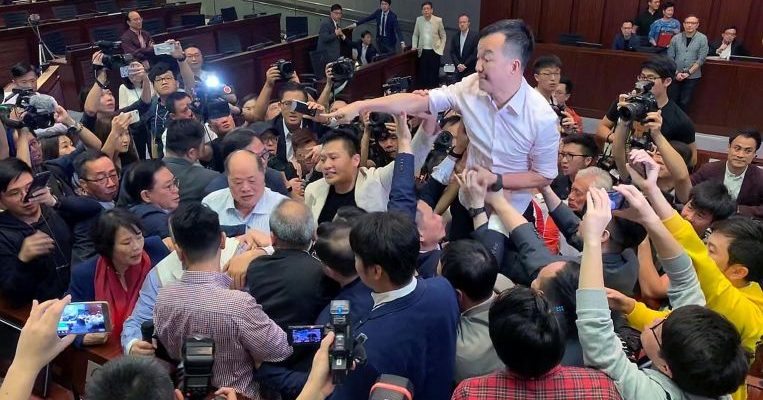
HONG KONG • Anger over Hong Kong’s controversial plans to in the city’s legislature as rival lawmakers scuffled with each other in chaotic scenes yesterday.
The legislative meeting on the government’s disputed extradition Bill was originally chaired by pro-democracy lawmaker James To, but the pro-Beijing camp earlier last week forcibly unseated Mr To and replaced him with their choice of chairman, Mr Abraham Shek.
Rancour between the two political camps exploded with rival lawmakers shouting and tussling amid a dense pack of reporters, as pro-democracy lawmakers tried to seize the microphone and stop their counterparts in the legislature from controlling the meeting.
Pro-democracy lawmaker Gary Fan collapsed and was carried out from the chamber on a stretcher, while others from the pro-Beijing camp claimed they were wounded.
“We couldn’t possibly agree to the suggestion that our meeting chaired by James To should be suspended in any way, because it is completely constitutional and legal,” pro-democracy lawmaker Claudia Mo said after the meeting.
But pro-Beijing lawmaker Shek insisted it is “legal” for him to host the meeting.
‘LEGAL AND CONSTITUTIONAL’
We couldn’t possibly agree to the suggestion that our meeting chaired by James To should be suspended in any way, because it is completely constitutional and legal.
PRO-DEMOCRACY LAWMAKER CLAUDIA MO, on the pro-Beijing camp forcibly unseating Mr James To and replacing him with their choice of chairman, Mr Abraham Shek.
“It’s a sad day for Hong Kong,” said pro-establishment lawmaker Elizabeth Quat about the violence.
“We laughed at Taiwan’s legislature in the past, but Hong Kong’s is even worse,” she told reporters.
Hong Kong’s government is pushing a Bill through the city’s legislature which would allow case-by-case extraditions to any jurisdictions it does not already have an agreed treaty with, including mainland China, Macau and Taiwan.
The plan has sparked huge protests and mounting alarm within the city’s business and legal communities – as well as foreign governments – who fear it will hammer the semi-autonomous financial hub’s international appeal and tangle people up in China’s court system.
Historically, Hong Kong has baulked at mainland extraditions because of the opacity of China’s criminal justice system and its liberal use of the death penalty. Tens of thousands of people hit the streets last month to protest against the Bill.
Hong Kong leader Carrie Lam has insisted on the need for arrangements to extradite offenders to China and Taiwan, an island Beijing claims as its own, and other jurisdictions that do not have extradition treaties with the city.
She cited the case of 20-year-old resident Chan Tong Kai, who allegedly murdered his pregnant girlfriend, Ms Poon Hiu Wing, also from Hong Kong, during a Valentine’s Day holiday in Taipei last year, and then flew home. Police could not charge him with murder or extradite him to Taiwan because there is no agreement in place.
But Taiwanese authorities said last Friday that Taipei has no intention of asking Hong Kong to return the murder suspect because it is concerned that Hong Kong’s extradition law puts its people at risk of being snatched by China.
Mr Chiu Chui-cheng, Deputy Minister of Taiwan’s Mainland Affairs Council, said Taiwanese people feared ending up like Lee Ming-che, a democracy activist who disappeared on a trip to the Chinese mainland and was later jailed for “subverting state power”.
Hong Kong’s opposition democratic lawmakers hold less than a third of the seats in the city’s 70-seat legislature, meaning they cannot veto the legislation when it goes to a final vote, possibly in weeks.
“We will make use of all the rules of procedures to delay the legislation as much as we can,” said Democrat Lam Cheuk Ting.
AGENCE FRANCE-PRESSE, REUTERS
